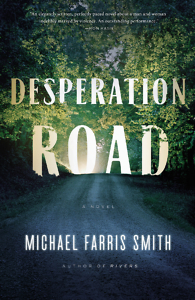Strays
Desperation Road is Michael Farris Smith’s redemptive tale of two broken lives
 For each generation of Mississippi writers, the anxiety of influence looms large. There are more than a few gods to contend with in that most hallowed and haunted of literary states, from Faulkner through Welty and on to Percy and Foote, Gilchrist and Ford, Hannah, Morris, Brown, and too many others to name. For all the tragedy in its history, Mississippi reveres its great writers, and the standard for admission into their ranks is high. With Desperation Road, a tale which fuses the hardboiled, violent elements of noir with patient, graceful characterization and drop-dead gorgeous prose, Michael Farris Smith proves his Mississippi literary mettle, in spades.
For each generation of Mississippi writers, the anxiety of influence looms large. There are more than a few gods to contend with in that most hallowed and haunted of literary states, from Faulkner through Welty and on to Percy and Foote, Gilchrist and Ford, Hannah, Morris, Brown, and too many others to name. For all the tragedy in its history, Mississippi reveres its great writers, and the standard for admission into their ranks is high. With Desperation Road, a tale which fuses the hardboiled, violent elements of noir with patient, graceful characterization and drop-dead gorgeous prose, Michael Farris Smith proves his Mississippi literary mettle, in spades.
Smith’s people exemplify the downwardly mobile white working class you’ve been hearing about so much lately. As the story opens, Russell Gaines has just returned to his hometown in Southern Mississippi after a ten-year stretch in prison for vehicular manslaughter. The woman he was to marry has moved on and started a family with another, and the brothers of the boy he killed while driving drunk don’t consider ten years’ incarceration punishment enough for his crime.
Enter Maben, a misbegotten waif running from her demons with a small daughter in tow. Desperate for money, she decides to turn a few tricks in a truck-stop parking lot, only to be apprehended by an unscrupulous sheriff’s deputy. Instead of arresting her, the deputy takes Maben to a darkened road, rapes her, and then calls a few friends to come out for a turn. Terrified of what will become of her daughter Annalee, whom she has left alone in a cheap hotel room, Maben manages to seize the deputy’s gun and use it in the way anyone in her circumstances most likely would. Fates collide, and Russell—reckless but noble, bent on redemption—takes Maben and Annalee on as a cause, setting them up in a garage apartment at his father’s property outside of town, and unwittingly setting himself up as the prime suspect in the deputy’s murder.
Given the sensational nature of this thumbnail sketch and some of the obvious trappings of crime fiction, it might come as a surprise to learn that Desperation Road is much more a tender study of people trying to recover from wrecks of their own making than boiler-plate Southern noir. Smith knows how to craft a well-paced plot that keeps the pages turning, but the most thrilling and memorable moments in Desperation Road come courtesy of its author’s gifts as a literary stylist. He writes about hard people and hard times in a voice both compassionate and musical.
Smith’s empathy is most palpable in his treatment of Maben, the young mother so unlucky in life she can’t bring herself to believe she deserves anything but more ill fortune:
She had discovered that once things started to go bad they gathered and spread like some wild, poisonous vine, a vine that stretched across the miles and the years from the shadowy faces she had known to the lines she had crossed to the things that had been put inside her by strangers. It spread and stretched until the vine had consumed and covered her, wrapping itself around her ankles and around her thighs and around her chest and around her throat and wrists and sliding between her legs and as she looked down at the girl with her sunburned forehead and her thin arms she realized that the child was her own dirty hand reaching out of the thicket in one least desperate attempt to grab on to something good.
 If those cascading conjunctions-sans-commas call to mind that most notorious of Mississippi’s many famous voices, Michael Farris Smith wouldn’t likely shy away from the comparison: he has actually placed one of Faulkner’s most oft-repeated quotations—“The past is never dead”—in italics over the text of Chapter One. Many Southern writers flinch at being compared to the maestro; almost as famous as that bit about the past is Flannery O’Connor’s droll admonition against getting your mule and wagon stuck on the tracks when the Dixie Limited comes roaring through. But Michael Farris Smith seems too honest and earnest not to embrace his influences. I have little doubt that Larry Brown and Barry Hannah and even Faulkner himself would approve.
If those cascading conjunctions-sans-commas call to mind that most notorious of Mississippi’s many famous voices, Michael Farris Smith wouldn’t likely shy away from the comparison: he has actually placed one of Faulkner’s most oft-repeated quotations—“The past is never dead”—in italics over the text of Chapter One. Many Southern writers flinch at being compared to the maestro; almost as famous as that bit about the past is Flannery O’Connor’s droll admonition against getting your mule and wagon stuck on the tracks when the Dixie Limited comes roaring through. But Michael Farris Smith seems too honest and earnest not to embrace his influences. I have little doubt that Larry Brown and Barry Hannah and even Faulkner himself would approve.
Desperation Road includes a few missteps—most notably a coincidence that stretches credulity and seems unnecessary given the novel’s many strengths—but I’d rather see a writer swing for the fences than play it safe. The best novels are a little flawed: like people; like life. Desperation Road is just that sort of book, and Michael Farris Smith is my kind of writer, a born storyteller with style to burn and a heart on the page as big as the sun.

Ed Tarkington’s debut novel, Only Love Can Break Your Heart, was published by Algonquin Books in January 2016. He lives in Nashville.


